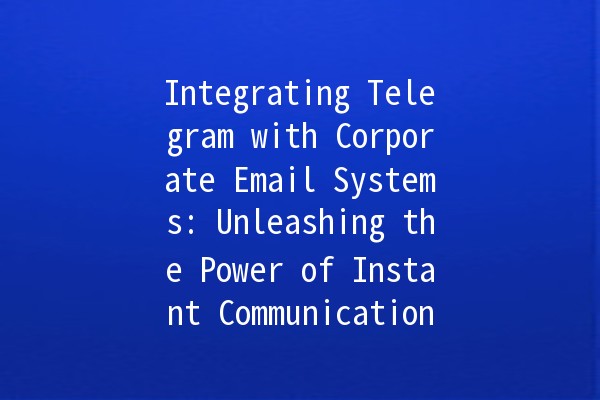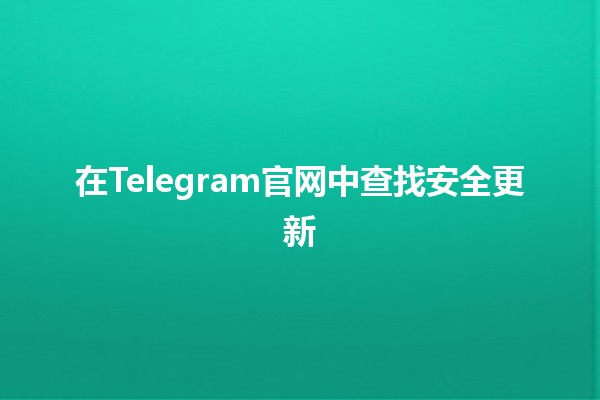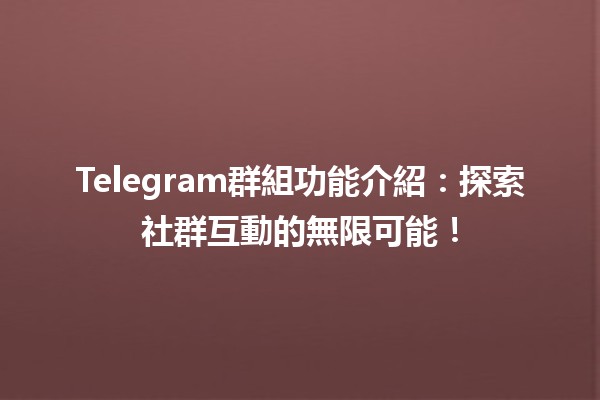Integrating Telegram with Corporate Email Systems: Unleashing the Power of Instant Communication

In today’s fastpaced business environment, effective communication is pivotal. Companies constantly seek ways to streamline their processes, ensuring quick and efficient collaboration among team members. As digital communication platforms evolve, integrating tools like Telegram with traditional corporate email systems has become a point of interest. This article explores the benefits, strategies, and practical insights regarding the integration of Telegram and corporate email systems while maintaining a focus on enhancing communication within organizations.
Understanding the Importance of Communication Tools
Before delving into integration strategies, it is essential to understand why communication tools play such a crucial role in modern workplaces. Traditional email systems are often seen as formal and slow, suitable for documentation but not for rapid exchanges of information. In contrast, instant messaging platforms like Telegram permit realtime communication, making them ideal for quick updates, informal discussions, and immediate feedback.

The Shift Towards Instant Communication
The shift towards instant communication tools in corporate environments reflects various changing dynamics:
The combination of Telegram’s instant messaging capabilities with an organization’s email system can bridge the gaps associated with traditional communication methods, leading to enhanced productivity and improved employee satisfaction.
Overview of Telegram
Telegram is a cloudbased instant messaging app known for its speed, security, and expansive functionalities. With features such as:
Channels: For oneway broadcasting to a large audience.
Groups: For discussions among up to 200,000 participants.
Bots: To automate tasks and interact with users.
These functionalities provide businesses with versatility and efficiency, making Telegram a compelling choice for corporate integration.
Benefits of Integrating Telegram with Corporate Email Systems
Integrating Telegram with corporate email systems can yield numerous benefits, including but not limited to:
While emails can foster detailed exchanges, they often come with delays in response times. Telegram allows for immediate communication, which can be critical during timesensitive projects. Sending a message or notification through Telegram ensures quick dissemination of information.
When teams communicate through Telegram, they can share ideas, files, and updates instantly. For instance, a marketing team collaborating on a campaign can quickly exchange thoughts, making realtime adjustments and decisions without the lag associated with email threads.
By integrating the two communication platforms, employees can enhance their productivity. They can receive email notifications directly in Telegram, allowing for prompt actions without switching between applications. This seamless workflow minimizes distractions and keeps team members focused on their tasks.
Telegram’s interactive features, such as polls and surveys, can help organizations engage their employees better. Integrating these features with email systems allows businesses to gather feedback and insights instantly, driving more participation and collaboration.
Security is paramount in corporate communication. Telegram offers endtoend encryption, ensuring that messages remain secure. By incorporating this with corporate email systems, businesses can safeguard sensitive information exchanged among employees.
Strategies for Integration
To effectively integrate Telegram with corporate email systems, organizations can follow several outlined strategies:
Creating Telegram bots can significantly enhance the integration process. You can set up bots that notify team members about critical emails or updates directly in Telegram. This way, important communications are brought to the user's immediate attention.
Creating a Telegram Bot:
Register the bot with Telegram’s BotFather.
Generate a unique token for API interactions.
Use coding platforms like Node.js or Python to develop functionalities for sending notifications from emails to Telegram.
Most corporate email systems come with APIs that allow for external integration. By leveraging these APIs, businesses can synchronize email data with Telegram.
Example Scenario:
When an important email is received, an API can send a message to a designated Telegram group or channel alerting the relevant staff members. This strategy ensures quick visibility and decisionmaking.
To maximize the efficiency of the integration, organizations can set up automated response features. For instance, when a team member sends a particular command in Telegram, they can receive email responses or alerts, making processes like approval or report requests seamless.
Integrating project management tools with both Telegram and email can enhance task management. Team members can assign tasks via email, and notifications can be sent through Telegram, keeping everyone informed and accountable.
A successful integration requires training employees on utilizing both platforms effectively. Provide resources and training sessions to help team members understand how to leverage Telegram alongside their existing email systems.
Best Practices for Maintaining Integration
Keep both Telegram and email systems updated to ensure compatibility and security. Regularly check for new features and updates that can further enhance integration.
Continuously seek feedback from team members regarding the integration process. Understanding what works and what doesn’t can help finetune the systems to better serve the organization’s needs.
Utilize available analytics to monitor communication patterns. Analyzing the response times and engagement levels can provide insight into the effectiveness of the integration, helping identify areas for improvement.
Ensuring that communication remains secure should always be a priority. Establish protocols for maintaining confidentiality, especially when dealing with sensitive company data.
For integration to be successful, employees must embrace the system. Encourage team members to utilize both platforms for communication, highlighting the benefits of the integration for their workflow.
Challenges in Integration
Despite its advantages, integrating Telegram with corporate email systems is not without challenges:
Employees accustomed to traditional email systems may resist adopting new tools. Proper training and communication about the benefits can mitigate this challenge.
Technical glitches or software compatibility issues can arise during integration. It is crucial to have IT support readily available to address these problems swiftly.
Integrating communication platforms can lead to information overload if not managed properly. Businesses should establish clear communication protocols to avoid overwhelming team members with excessive notifications.
While Telegram offers encryption, concerns over data security can arise, especially when sensitive information is shared. Organizations must conduct regular security assessments to ensure compliance with data protection regulations.
Integrating Telegram with corporate email systems presents an exciting opportunity to enhance communication within organizations. By leveraging the strengths of both platforms, businesses can foster a more collaborative, efficient, and productive work environment. The benefits of faster communication, improved team engagement, and automated processes are too significant to overlook.
However, successful integration requires a strategic approach, encompassing the understanding of both tools, employee training, and ongoing evaluation of the integration effectiveness. While challenges may arise, addressing them proactively can lead to a more cohesive communication structure that ultimately drives business success. Embracing such innovative integrations is not just a trend; it is an essential step towards remaining competitive in today’s dynamic business landscape.
Other News

在Telegram官网中查找安全更新 🔒✨

如何在Telegram中创建和分享链接📱🔗

如何在Telegram上创建和管理讨论组🗨️
